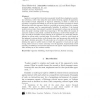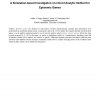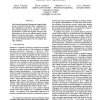251 search results - page 15 / 51 » On the Complexity of Learning Lexicographic Strategies |
AAMAS
2005
Springer
13 years 10 months ago
2005
Springer
Agents in a competitive interaction can greatly benefit from adapting to a particular adversary, rather than using the same general strategy against all opponents. One method of s...
NN
2006
Springer
13 years 10 months ago
2006
Springer
We discuss an important property called the asymptotic equipartition property on empirical sequences in reinforcement learning. This states that the typical set of empirical seque...
EDM
2010
13 years 12 months ago
2010
Epistemic games are designed to help players develop domain-specific expertise that characterizes how professionals in a particular domain reason, communicate, and act [1, 11]. To ...
IJCAI
1989
13 years 11 months ago
1989
Each concept description language and search strategy has an inherent inductive bias, a preference for some hypotheses over others. No single inductive bias performs optimally on ...
AH
2004
Springer
14 years 3 months ago
2004
Springer
: This paper presents an evaluation study that compares two different problem selection strategies for an Intelligent Tutoring System (ITS). The first strategy uses static problem ...



